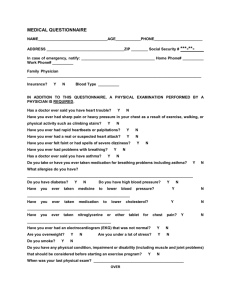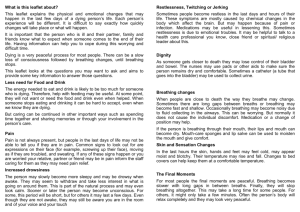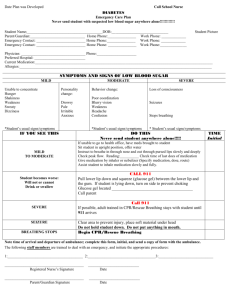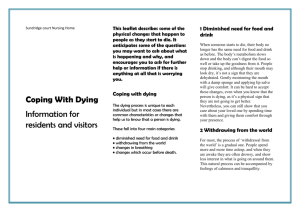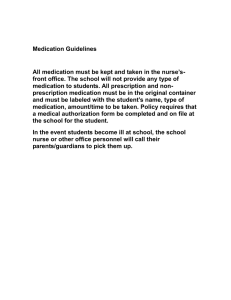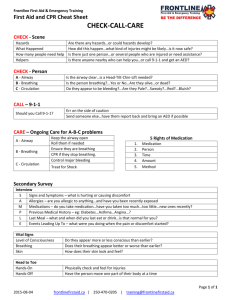Understanding the changes that may occur during the dying process
advertisement
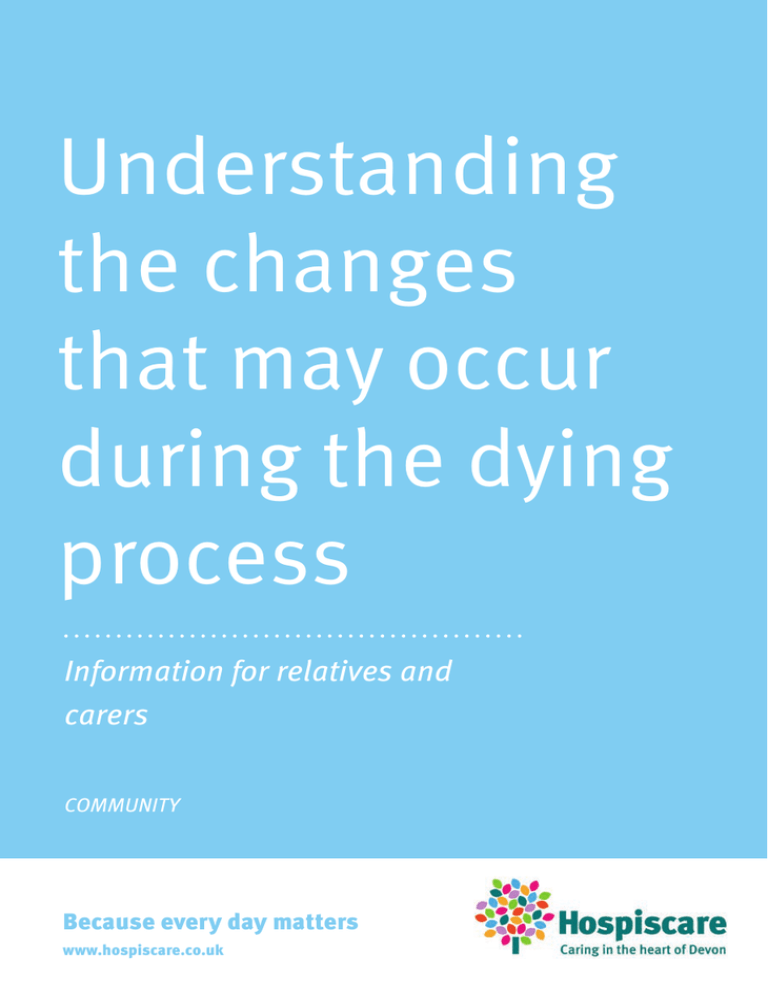
Understanding the changes that may occur during the dying process Information for relatives and carers COMMUNITY Because every day matters www.hospiscare.co.uk This leaflet describes some of the physical changes that happen to people as they start to die. You may want to ask about what is happening and why; this leaflet anticipates some of those questions. Please ask for further help or information if there is anything at all that is worrying you. Each person’s experience of the last few days of life will be different and it can be difficult to predict exactly what will happen or how quickly any changes will occur. These changes fall into four main categories: • Less need for food and drink • Withdrawing from the world • Changes in breathing • Changes which occur shortly before death This leaflet has been given to you to offer an explanation about those changes but please ask the Hospiscare nurse, community nurse or local doctor if you have any further concerns or need more information. Less need for food and drink When someone is no longer interested in eating and drinking, it can be very hard to accept even when you know it is because they are dying. The body’s metabolism slows down and is unable to digest food so well or take any goodness from it. The effort of eating and drinking can become simply too exhausting. A small mouthful at a time may be all that can be managed or desired. Help with feeding and drinking at this time might be appreciated. Eventually, a person may stop drinking altogether. Their mouth may appear dry, so you can 2 moisten it with a damp sponge provided by the community nurse, a baby toothbrush dipped in water, or a spray may be comforting. A lip salve will also help. If there is little apparent response, this may be due to weakness not lack of appreciation. Simply caring and being together may be of great comfort to both of you. Medication and treatment Medication is reviewed when swallowing becomes difficult. Anything that is no longer helpful or cannot be taken in the normal way may be stopped, given by an alternative route or a new preparation prescribed to treat any physical or psychological symptoms such as pain, nausea, breathlessness, anxiety or agitation. Medication may be given by injection or, if needed regularly, by a continuous infusion placed just under the skin via a pump called a syringe driver. This is set up by the community nursing team and replenished daily. If someone is no longer strong enough to talk about symptoms they are experiencing, pain can be shown by becoming restless or grimacing. Anxiety or agitation may also be shown by restlessness but is sometimes associated with confusion, twitching or jerky movements as well. All these symptoms can be helped with medication. If you are worried about any of these, please phone your doctor’s surgery or Hospiscare nurse. Our care is focused upon comfort and dignity. You may wish to talk about measures which can be taken to promote comfort whilst lying in bed (such as positioning and pressure relieving equipment) or the need for regular mouth care. Please ask any of the visiting community staff if you have concerns. 3 Withdrawing from the world For most, the process of ‘withdrawal from the world’ is a gradual one. The person will spend more time asleep and will often be drowsy when awake and show less interest in what is going on around them. This is a natural process and may even be accompanied by feelings of calmness and tranquillity. Eventually, this may lead into a state of unconsciousness which may last for a few minutes, a few hours or a few days. A person may still be aware of your presence and be able to hear what you are saying. Don’t be afraid to talk to them and explain any care given. You may wish to sit quietly and hold hands or recall shared memories and play some background music. Changes in breathing Towards the end of life, as the body becomes less active, the demand for oxygen lessens. People who suffer from breathlessness are often worried they may die fighting for breath but, often it is found that breathing eases as they start to die. Breathing can be easier than it has been for a long time. However, any breathing difficulties can be made worse by feelings of anxiety or fear. Reassurance, medication or the comforting knowledge that someone is close at hand can make a real difference. A much loved pet may also play a major part in reducing breathlessness caused by anxiety or fear. Occasionally, in the last hours of life, there can be a noisy rattle to the breathing. This is due to a build up of mucus in the chest which the person is no longer able to cough up. Medication may be used to reduce it and changes of position can also help. The noisy breathing can be upsetting to hear but it does not appear to distress the dying person. 4 Changes which occur shortly before death The dying process is unique to each person but in most cases, there are some common signs which help to indicate that a person is dying. The breathing pattern may change again. There are sometimes long pauses between breaths and/or the abdominal (tummy) muscles will take over the work. The abdomen rises and falls instead of the chest. Breathing can appear laboured but this is more distressing to you than the person dying. Medication can be given if there are signs of distress but these changes in breathing are an expected part of dying. Some people can become more restless and agitated as death approaches. If this is the case, it is important to contact the surgery or out of hours service so that medication can be administered in the form of pain relief and/or a sedative to help ease any symptoms which may be causing the person distress. The skin can become pale and moist and slightly cool prior to death. Most people do not rouse from sleep but die peacefully and comfortably. Their breathing will get slower and eventually stop. Sometimes it is difficult to pin point the exact moment of death. After a short time, the body may relax completely and look peaceful. Even though the death is expected, it can still be a huge shock when it actually happens. 5 What happens now? When someone dies, there is no need to do anything immediately. You may need a few minutes (or longer) to understand what has just happened. When you are ready, you will need to ring your doctor’s surgery (or the out of hours service) to inform them of the death. A doctor or community nurse has to visit to verify that the person has died. A death certificate is unlikely to be issued at this time. The visiting doctor or community nurse will provide you with further information regarding this. You may phone the funeral director, if you wish, while you are waiting for the nurse/doctor to visit (or you can wait until afterwards). The funeral directors will provide further guidance at this difficult time. You may also wish to ring a relative or a friend who can stay with you and offer their support for a while. 6 7 Hospiscare is a charity Hospiscare is a local charity. It costs over £6 million to run Hospiscare each year. The majority of our funding comes from our local community, who raise funds in all manner of ways. We are proud that we spend 88p of every £1 raised on patient services. Our services are free of charge to everyone in the area who needs them. If you would like to make a contribution towards the charity, please let us know. Tell us about your experience of Hospiscare Hospiscare welcomes feedback, compliments and complaints and we use them to develop our staff and services. We know we don’t always get things right and that you may wish to complain about our service. We investigate complaints thoroughly and treat them as an opportunity to learn and improve our practice. To make a complaint please contact: Liz Gibbons, Director of Nursing Hospiscare, Searle House, Dryden Road, Exeter EX2 5JJ Phone: 01392 688000 After we receive your complaint, we will send you a letter or email with details of any investigation with an expected timescale where possible. If you wish to see a copy of Hospiscare’s Complaints Policy please ask. If you are dissatisfied with our response to your complaint you can contact: The Parliamentary and Health Service Ombudsman Millbank Tower, Millbank, London SW1P 4QP Email: phso.enquiries@ombudsman.org.uk Customer Helpline Tel: 0345 015 4033 Let us know if you would like the information in this leaflet in a different format; for example in large print or spoken word. Hospiscare is registered by: Care Quality Commission, Finsbury Tower, 103-105 Bunhill Row, LONDON EC1Y 8TG www.cqc.org.uk RW 09/2016 Hospiscare, Searle House, Dryden Road, Exeter, EX2 5JJ Telephone: 01392 688000 Fax: 01392 495981 www.hospiscare.co.uk Registered charity no. 297798
